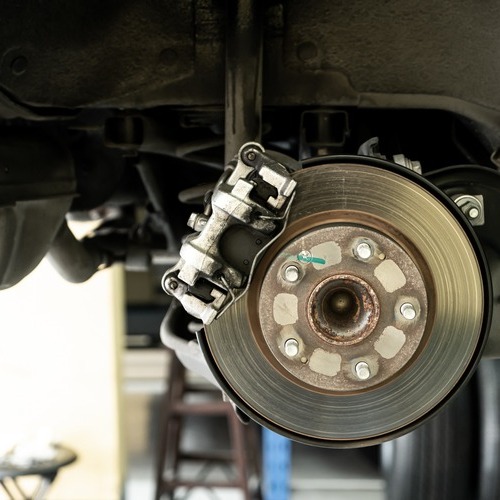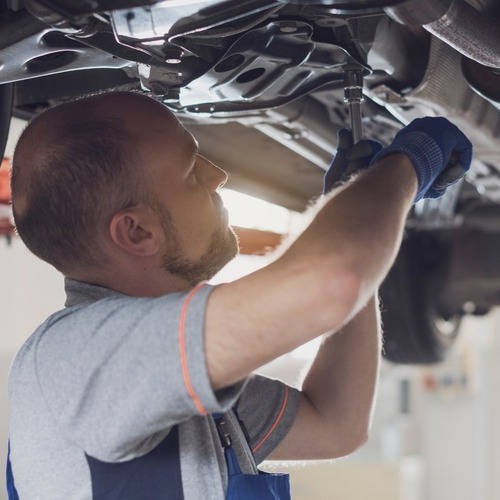
Get Your Brake Fluid Checked
So, how can you tell if your car’s brake system needs fluid? Well, a sure indication would be when your car doesn’t stop. However, that can be for other reasons too like a broken brake line. It only makes sense to make sure you have ample brake fluid, just like you would the gas and oil, before you hit the roadways of Mission Viejo, California.
What is brake fluid and what does it do?
Brake fluid is a hydraulic type of fluid that runs through brake lines, reaching each wheel of a car. When the brake pedal is pressed, the brake fluid lets that force from pushing the pedal be applied to the brake lines, slowing the vehicle down to a complete stop.
Should brake fluid be replaced, and if so, how often?
Over time, brake fluid breaks down. Some vehicle manufacturers recommend changing the brake fluid every 24 months. Other vehicle manufacturers recommend changing the brake fluid every 45,000 miles or every 3 years, whichever comes first.
Are there different types of brake fluid?
The braking system on every vehicle is designed to use a specific type of brake fluid. When it is time to add or change brake fluid, it is necessary to use the appropriate type. As mentioned earlier, brake fluid is a hydraulic type of fluid that relies on incompressible fluid to transmit force.
When brake fluid reaches a certain boiling point, it becomes a gas substance and loses some of its braking power. This is why “riding your brakes” is not recommended. The different types of brake fluid are:
- DOT3
- DOT4
- DOT5
- DOT3 and DOT4 brake fluids absorb water and as it heats up to a boiling point, the water decreases. This saves your brake system from rusting.
- DOT5 brake fluid doesn’t absorb water so the boiling point remains reasonably stable. However, because it doesn’t absorb water, if any water gets in the brake system, you can expect to need brake repair or replacement.
What are the dangers of using the wrong type of brake fluid?
Using the wrong brake fluid is just as damaging as using the wrong gasoline or oil. The lubrication process is affected and can lead to the brakes overheating. It can even cause your transmission to fail and the worse part of this is that the damage may not be repairable.
What are the signs of a brake fluid leak?
Properly working brakes have sufficient brake fluid and tightly connected brake lines. How can you tell if your car is leaking brake fluid?
- FLUID UNDER THE VEHICLE
If your vehicle has brake fluid leaking, it will be a brownish, light yellow fluid pooling at the rear wheels.
- WARNING LIGHT ILLUMINATED
When the brake light is illuminated and stays illuminated, you need to have the brake fluid and the entire brake system checked.
- SOFT, SPONGY BRAKE PEDAL
When you press on the brake pedal and it feels soft or spongy, check for the brake fluid. If the level is okay, take your car in for a brake inspection and repair.
- BRAKE FLUID LEVEL LOW
If the brake fluid level is low over a period of time, you probably have a brake fluid leak. You can check the brake fluid reservoir yourself or have your mechanic check it for you.
What should I do if my brake fluid is low?
If you have checked your own brake fluid level, you probably know where to add more brake fluid. This should be done before you drive the car any further. If you have your brake fluid checked by a mechanic, they will add more fluid for you. If this is done while you’re getting your oil changed, some stations won’t charge you for the brake fluid.
How can I tell if my brake fluid needs to be flushed?
In addition to having soft or spongy brakes, or the brake light is illuminated on your dash, there are two more indicators you need to have your car’s brake system flushed:
- Braking Performance Ineffective
Your vehicle’s brakes should be quick to respond when you press the pedal. If it delays in reacting or appears to have difficulties in slowing or stopping, have your mechanic do a brake flush and inspection. There may be warped rotors, the brake pads are worn, or there may be other issues with your vehicle.
- Strange Odors and Sounds
If you notice strange odors or sounds when you press the brake pedal, it could be an indication the brake fluid is low.

In Conclusion
Your vehicle is an investment and the brake system is a crucial part of the investment. Taking the time to have the brake fluid in Mission Viejo, CA checked by a Japanese Car Specialties mechanic is well worth the time it takes, not to mention the safety factor for you, your passengers, and those around you. Schedule a fluid check today by calling 949-583-0811.